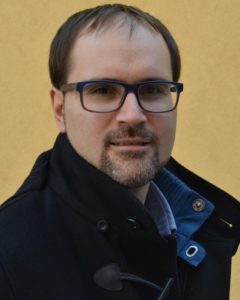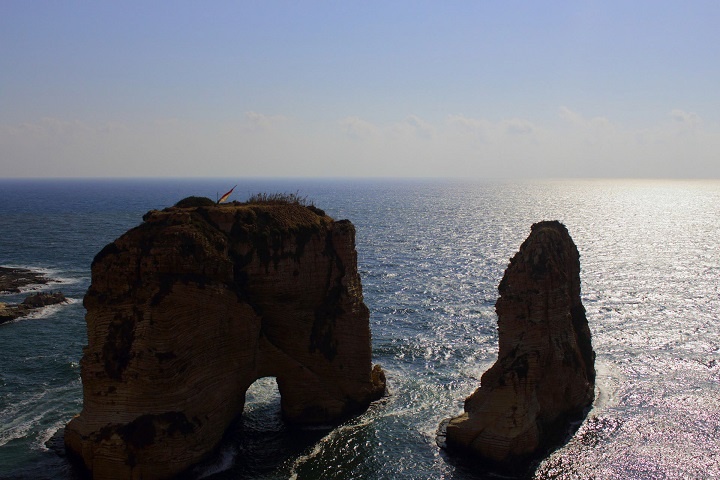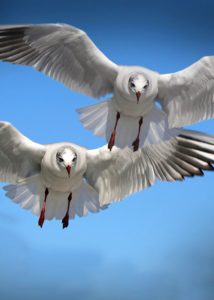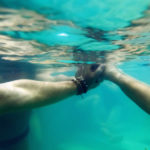Translated from the Serbian original “Mali gost” (book “Stories from Lebanon”, in Serbian as: Priče iz Libana) by the author.
WORDS: NIKOLA POPOVIĆ
PORTRAIT PHOTO: MARIO JELIČIĆ
PHOTOS: PIXABAY.COM

I know not where seagulls make their nest
where find they peace.
I am like them
in perpetual flight.
I skim life
like they do with the water catching food.
And perhaps like them too, I cherish quietness,
the great quietness of the sea,
but my fate is to live
wavering in the gale.
Vincenzo Cardarelli, Seagulls
Beirut is a city of birds. They fly here from the sea to the seafront and to the balconies of the buildings close to the shore. Our building’s name is Al-Manar –“the Lighthouse”. On the ground floor, in front of the lift, stands a big mirror and a statue of Voltaire. The tenants and the visitors are constantly observed by a vigilant eye of the philosopher of the Age of Enlightenment; if however something is missed by him, it will be noted by Abou Ali, the housekeeper, whose little window with slightly open curtains looks out over the lobby. He became the concierge, as Beirutis like to say using the French word, soon after the building was constructed, in 1971, and he has remained there ever since. Flanked by other buildings that have grown dilapidated with time, Al-Manar still looks relatively modern, although it has none of the ostentatious luxury of the glass-and-steel skyscrapers that have recently gone up nearby. As I continue to live here, it seems to me that this edifice combines, in a typical Beiruti manner, solid craftsmanship and kitsch, improvisation and the solidity of long-lasting and carefully chosen materials.
Today, as every morning, the concierge and I say hello to each other, while he is standing by the gate, in the street and the quartier where nothing surprises him. “Autumn is here,” he says, “the birds are migrating to Beirut. Look up towards the sky, there they are, spreading like the pattern of a shotgun…”
Later I bump into him in the Ardati street as he moves along the middle of the pavement, navigating through crowded Beirut like a sleepwalker, while motorcycles and cars pass next to him. He takes me by the wrist and says: “Look at those big seagulls, enormous as albatrosses, thieving like magpies. They are not from Lebanon. Ours are smaller, more delicate… If you go to the seaside, be careful when eating a sandwich, they can be fast as lightning, ready to swoop from the sky and grab their prey. Ours, however, the Lebanese ones, are delicate as doves, tremulous as sparrows.”
∗
About the seagulls, Abou Ali talks as if they were humans, and about the building like a man sensitive to wind, sun and cold:
“Whenever I see these big birds, I know that the winter will be harsh. I will check the heating system today, as well as the pipes. I worry mostly for the upper floors. I will also check if water puddles have gathered on the roof from the rain last night. These birds fly here to drink, make a mess and later everyone will say: ‘It is Abou Ali’s fault, he should have taken care of it…’”
The concierge greets the tenants every morning and evening, and he remembers details from other people’s lives perfectly, like a seismograph recording the smallest tremor of the soul. The conversation with Abou Ali gets everyone’s day off to a good start. The tenants get into their Toyotas, Nissans, or cars from the pre-war time. Abou Ali waters the cypresses and pittosporum in big vases, checks whether the interphone is still working well, fixes the doors of the elevator and complains about scribblings on its wall: hearts, dates, names of football clubs and all those things he defines as haram stuff. These he tries to remove right away, with brisk movements of sandpaper, humming “Haram, haram…What a shame…”
∗
Our rented apartment has a glass terrace that’s full of light during the day, as well as our living room, where mornings have blue nuances and evening are bathed in the warm tones of a dying sun, much as I imagine the light in a painter’s atelier. The owner of the apartment was a basketball player, and his late wife was, too. They both played for the national team. In the kitchen all the shelves are high up. On them there are carafes for wine, coffee jazzvas and teapots, ashtrays of green glass, medals from Olympic matches. The two met on the basketball court and in this apartment their three daughters, now living with their families in Qatar and Dubai, were born.
For many years now, master Bashir – as Beirutis call him – has spent half the year in the city and the other half staying with his daughters abroad. A sportsman and a businessman, he follows basketball matches and buys stocks on the stockmarket. Every conversation with him about details regarding our apartment is quick and efficient: “You are my guests. Do not worry, I will send someone to fix it tomorrow.” And workers are never late to the call of the basketball legend, knowing they will get a generous tip.
When talking about money, Bashir speaks slowly, paying equal respect to both sums big and small; to both to the one who’s paying the rent and the one receiving it. He is not bothered by the fact that our son will leave colour traces on the wall – his youngest daughter loved to draw in the same place. And besides, he will have it repainted once we move out anyway. “A house is not made by the walls, but by those who live in it,” he concludes. I like the discreet manners of the Beiruti gentleman, on whom Lacoste polo shirts still fit impeccably. He sent us flowers and a cake for New Year.
Bashir’s wife died in her early fifties, at the dawn of the Lebanese civil war: her athlete’s heart suddenly stopped beating. The tenants of Al-Manar still remember the lady with broad shoulders and her style: navy blue blazer and jeans, sunglasses that matched her strong eyebrows; the scent of her jasmine and rose perfume would remain in the elevator, and the hallway resonated with her laughter, spontaneous like that of a child.
“Some say she married him for money. Others say that he married her because her father was wealthy. But you should not believe these evil tongues, I will tell you, it was a big, Beiruti love,” Abou Ali tells me in confidence.
∗
In the evenings, the sky is full of stars. In Beirut, twilight lingers on and on, and the starts appear suddenly, as tiny as sparks. Above us, planes are descending toward the airport, we can see our terrace when landing. From the last, the tenth floor of the building, we see the roofs of small houses and the Saudi embassy, with its yellow façade and wonderfully carved wooden windows. In front of it, there is always a taxi driver known in the neighbourhood as “Sheriff”: he never drives, although his vehicle is always there; he greets everyone, he does not move his head but his eyes follow passers-by. He never looks up towards the sky like our concierge.
As for the streets in our neighbourhood, nobody calls them by their real names. The whole area is referred to alternatively to by the name of the Venezuelan capital, Caracas, after the bar that existed many years ago, or “Abou Taleb” – after the grocery shop that used to sell flour, spices and fruits.
From the terrace I see workers, Bangladeshi, as they walk to the little shop at the corner of the street, from where they send money and phone home for several cents per minute, waiting each Sunday in a queue. Beirutis love birds. And, like many other shops, this one this one has its bird: in front, there is a big cage with a parrot. The big blue and green macaw has become something of the mascot of the neighborhood. She rattles off greetings, as well as some swear works in Bengali and Arabic. People bring her grains and cuttlefish bones.
This weekend is the Beirut marathon; right now it’s the amateur race, and on our street a large crowd has gathered. The professionals, whose route snaked though Hamra to Downtown, have already finished. The winner is Fikadu Girma. Since the first Beirut marathon in 2003, three gold medals went four times to Kenya and eight times to Ethiopia – much to the delight of the good-sized Ethiopian community. The winner of the women’s race is Ethiopian, as well. We follow on TV as the athlete lifts her metal, blowing kisses to the audience. A slow motion sequence shows her crossing the finishing line, with a big smile and arms spread out, like the wings of a landing bird.
∗
Abou Ali knows the character of men and the behaviour of birds, how they hunt for their prey. Today a seagull flew through the sliding doors that open onto the terrace and into our apartment, enticed by a bowl of fruit on the dining table. Scared and powerless in the closed space, the bird was flapping its wings and helplessly kicking the glass in a pathetic attempt to get out. Our son was outside on the terrace at the time, and he pawed at the glass, thinking that he could touch the gull and leaving messy handprints on the door. The gull eventually found its way to the opening and walked slowly out onto the terrace, although it appeared too confused still to fly off. The boy walked toward the bird, wanting to grab it as he would a toy forgotten on the table. Remembering the birds of Belgrade, the gurgles the Serbian word for “pigeon.”
As for myself, I remember Triestine doves, flying above the Theresian quarter and around the Duino castle, where above the sea, the bora wind from the Kvarner archipelago marries fresh air from the Alps. A flock would land together, on the rocks next to the sea and, after a break, they would fly away in the same direction; but there always seemed to be one gull left behind, or one that would fly away from the pack, striking out in the opposite direction.” This seagull of ours seems to be a renegade, as well.
Our guest is still dizzy from butting up against the glass, and we offer him a few pine seeds that use in pesto. We’re afraid the gull might have a concussion. It is lying on the terrace, wheezing sadly.
“The bird might be dying or it is just gathering strength for a new flight,” concludes Abou Ali as he gingerly approaches the bird, smoothing its wings with his palms, kissing its little head and whispering to it. His wife is here, too. She is teaching us how to clean an artichoke, with its strong leaves and tasty heart. With the first cold days, artichoke season has begun.
∗
At the end of the day, the seagull stood on the windowsill, stretched its neck and took another look to the inside. We are happy that the bird has found its way, from our building, whose name means “lighthouse” in Arabic.
“Today, our little guest has made us worry, like a child,” my wife says.
Here, on our Beiruti terrace, she took up watercolour painting after many years, first making a mess of the runny paints and eventually working with more confidence. She always paints what she sees in front of her, the buildings and countryside: the Jounieh bay, and when the sky is clear, contours of Harissa and Byblos. She likes the vivid colours and ornaments of the Orient, she wears knitted cashmere scarves. Once finished, she never retouches her painting; she finds a place for it on the wall in a glance and never moves it again. While removing the water from the brush, her face wrinkles a bit, but while making another move, she is smiling, like a girl.
∗
The seagull has flown away. The next morning the neighborhood will wake to the crows of the rooster, raised by a Bangladeshi tailor on the street behind ours. He makes saris and shirts with different sort of collar that’s popular in the East.
It is cold and Abou Ali has turned on the heating system in the building, the radiators are warm. Holding my son in my arms, I am watching Beirut through the glass. Along the ivy-covered walls, there are wires and cables, hung between two buildings, connecting signals for television and Internet. Next to each building there is a generator for electricity. Somewhere, according to the local tradition, one can see yellow and green banners, by which families announce their news, joyous and sad. After three months, we have gotten used to this place, with all its imperfections, and we are already calling Beirut home.
Foreigners who come to Beirut usually settle in the hill of Ashrafieh, where the modern buildings and art galleries are modeled after Europe, neighbours greet each other in French and the kids attend the schools of Maronite monks and nuns. Our instinct, however, led us here, to Hamra, to the building overlooking the sea. To the street full of sound and movement, in the quarter of perpetual change. Long ago, the neighborhood consisted of only two buildings, one yellow and one of the colour of a rose. Those two first buildings are still painted their original colors, and, observed from a bird’s overhead perspective, you can see how the neighborhood developed around those two first pioneers. Before, the sea was closer, then it withdrew in front of the concrete, until the seafront was built. But still, birds – small and big ones – fly from distant places to the warmth of Beirut.




